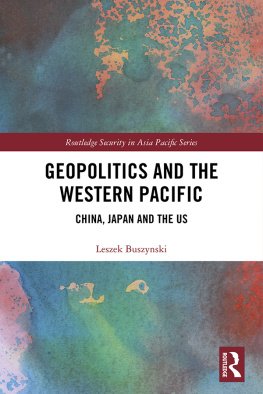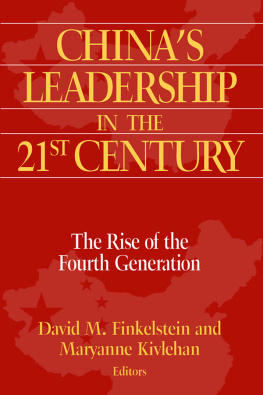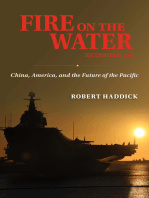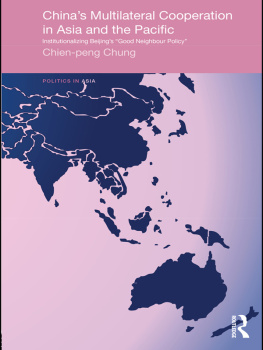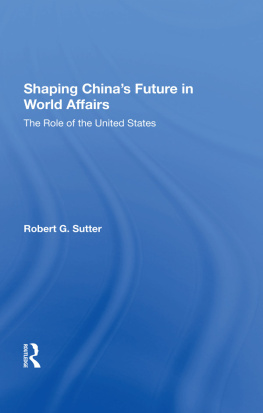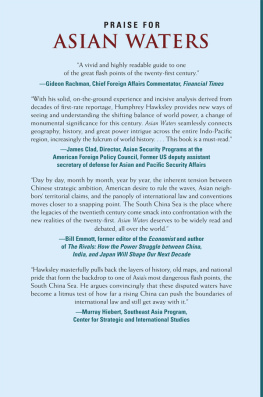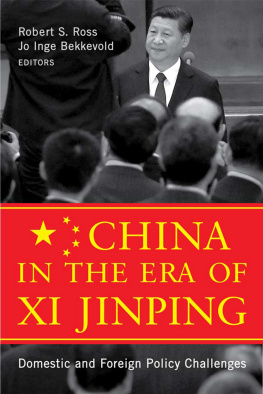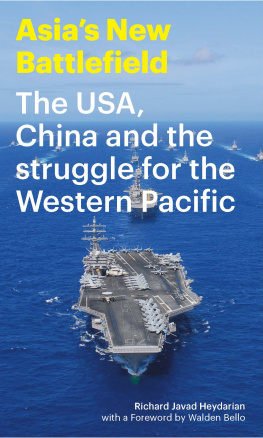Geopolitics and the Western Pacific
This book examines the development of Chinas national ambitions under its current leader Xi Jinping and the dilemma they present for the United States and also Japan. It emphasises the importance of geopolitics, that is the way national strategies and policies are shaped and in some cases determined by geographic location. Focusing especially on Chinas national rejuvenation and its rapidly growing military capability and navy, and on the likely impact on the region of China regaining the status and influence it enjoyed in dynastic times, the book highlights the hard choices faced by the United States as it seeks to protect its geopolitical position in the Western Pacific, particularly in the South China Sea, the Korean Peninsula and the Taiwan straits. How far should the United States confront China or accommodate China, possibly at the risk of undermining its geopolitical position and its alliance relationships with Japan, Australia and South Korea? The book also discusses the degree to which issues of institution building and economic interdependence can overcome or constrain geopolitical calculations.
Leszek Buszynski is a Visiting Fellow at the Strategic and Defence Studies Centre at the Coral Bell School of Asia Pacific Affairs, Australian National University.
Routledge Security in Asia Pacific Series
Series Editors
Leszek Buszynski
Strategic and Defence Studies Centre, Coral Bell School of Asia Pacific Affairs, Australian National University
and
William Tow
Australian National University.
Security issues have become more prominent in the Asia Pacific region because of the presence of global players, rising great powers and confident middle powers, which intersect in complicated ways. This series puts forward important new work on key security issues in the region. It embraces the roles of the major actors, their defence policies and postures and their security interaction over the key issues of the region. It includes coverage of the United States, China, Japan, Russia, the Koreas, as well as the middle powers of ASEAN and South Asia. It also covers issues relating to environmental and economic security as well as transnational actors and regional groupings.
South Asias Nuclear Security
Bhumitra Chakma
The New US Strategy towards Asia
Adapting to the American pivot
Edited by William T. Tow and Douglas Stuart
Vietnam and the South China Sea
Politics, Security and Legality
Do Thanh Hai
Japans Search for Strategic Security Partnerships
Edited by Gauri Khandekar and Bart Gaens
Geopolitics and the Western Pacific
China, Japan and the US
Leszek Buszynski
Geopolitics and the Western
Pacific
China, Japan and the US
Leszek Buszynski
First published 2019
by Routledge
2 Park Square, Milton Park, Abingdon, Oxon OX14 4RN
and by Routledge
52 Vanderbilt Avenue, New York, NY 10017
Routledge is an imprint of the Taylor & Francis Group, an informa business
2019 Leszek Buszynski
The right of Leszek Buszynski to be identified as author of this work has been asserted by him in accordance with sections 77 and 78 of the Copyright, Designs and Patents Act 1988.
All rights reserved. No part of this book may be reprinted or reproduced or utilised in any form or by any electronic, mechanical, or other means, now known or hereafter invented, including photocopying and recording, or in any information storage or retrieval system, without permission in writing from the publishers.
Trademark notice: Product or corporate names may be trademarks or registered trademarks, and are used only for identification and explanation without intent to infringe.
British Library Cataloguing-in-Publication Data
A catalogue record for this book is available from the British Library
Library of Congress Cataloging-in-Publication Data
A catalog record has been requested for this book
ISBN: 978-1-138-47732-2 (hbk)
ISBN: 978-1-351-10512-5 (ebk)
Typeset in Times New Roman
by Wearset Ltd, Boldon, Tyne and Wear
Contents
One way or another geopolitics is an intriguing topic, one that has stimulated the thinking of observers of international security over past decades. I am grateful to those Chinese scholars who expressed their thoughts to me about Chinese domestic politics and regional affairs. Needless to say, they will remain nameless. I would like to thank Russell McCaskie for his painstaking reading of successive drafts of the text and the stimulating discussions I had with him about the ideas contained within. Also Dr. David Rosenberg for his suggestions and comments on how to improve the draft and for issues with the text that his practiced eye detected. The interpretation of events and trends is my own and any errors of fact are, of course, my responsibility.
| ADIZ | Air Defence Identification Zone |
| ASW | Anti Submarine Warfare |
| CCDI | Central Committee for Discipline Inspection |
| CMC | Central Military Commission |
| DMZ | Demilitarised Zone |
| DPJ | Democratic Party of Japan |
| DVD | Digital Video Disc |
| EEZ | Exclusive Economic Zone |
| FALSG | Foreign Affairs Leading Small Group |
| HEU | High Enriched Uranium |
| IAEA | International Atomic Energy Agency |
| ICBM | Intercontinental Ballistic Missile |
| ICJ | International Court of Justice |
| IRBM | Intermediate-Range Ballistic Missile |
| KCNA | Korean Central News Agency |
| kt | Kilotons |
| LDP | Liberal Democratic Party |
| LSG | Leading Small Group |
| MARV | Manoeuvrable Re-entry Vehicle |
| MOFA | Ministry of Foreign Affairs |
| NATO | North Atlantic Treaty Organization |
| NGO | Non Government Organisation |
| PAP | Peoples Armed Police |
| PCA | Permanent Court of Arbitration |
| PLA | Peoples Liberation Army |
| SOE | State-Owned Enterprise |
| SSBN | Ship Submersible Ballistic Nuclear |
| THAAD | Terminal High Altitude Area Defence |
| TPP | Trans Pacific Partnership |
| UNCLOS | UN Convention of the Law of the Sea |
| VPN | Virtual Private Networks |
| WTO | World Trade Organization |
This book is about geopolitics and stresses its importance in understanding state behaviour and rivalry in the Western Pacific. Geopolitics identifies the impact of geography on policy and how geographic location impacts upon security and foreign policy. It examines how geography shapes and influences power relations between states, how they formulate their security and foreign policies in a given geographical context and how they seek to influence the policies of others. Geographic location gives rise to certain consistent and regular responses in security and foreign policy that leaders promote, which, over time, become tradition or doctrine for the state concerned. Geopolitics involves power, which is a relational concept and is understood as the ability and capacity to control or set the terms of relationships with other states, or to get others to do ones bidding. It can involve military force and its use to influence the behaviour of others particularly weaker states, but it also embraces diplomacy and economics. Most states have geographically defined interests that they will protect, or certain critical areas that are vital for their security that must be controlled or kept out of the hands of competitors and rivals. Geopolitics is not a theory, but rather an approach to understanding policy in certain conditions and parameters and identifying vital interests where military power may be employed, and peripheral or distant interests where military power would not be considered. Geopolitics starts with the basic assumption that every state is located in a geographic setting of some description that conditions its behaviour, foreign policy and security. Some states are located in benign geographic settings sharing borders with friendly neighbours, as in the case of Western Europe or Scandinavia. For them, the concept of geopolitics has little meaning and in the absence of threat their foreign policies uphold universal principles of justice, international law and the UN. Others, however, are not so fortunate and are located in uncertain regions such as Eastern Europe and the Baltic, where they share borders with an unpredictable and resentful Russia. Geopolitics has meaning for these states as the possibility of unrest or instability can never be ruled out. Yet other states exist in hostile regions such as the Middle East, where conflict and turmoil threaten the survival of states and where security threats are endemic. Geopolitics is a matter of survival for them.

